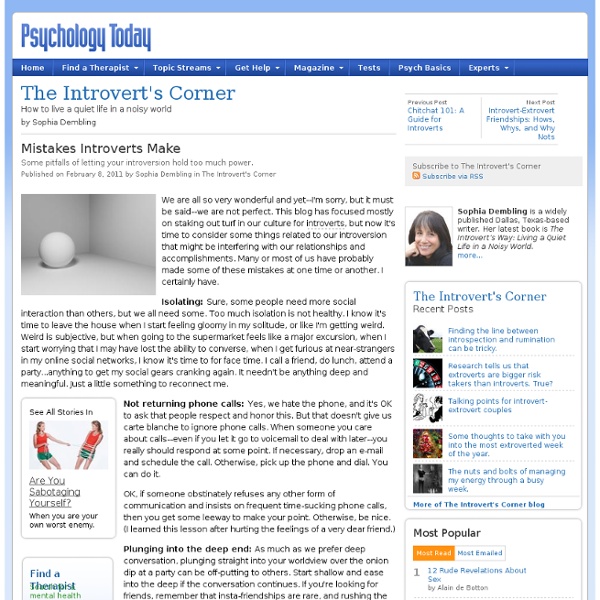Your Music, Your Personality
Just as a glimpse inside a bedroom or office provides clues about someone's character, so too can a peek at his music collection. The question "What kind of music do you like?" is so revealing, it is the number one topic of conversation among young adults who are getting to know each other, according to psychologists Jason Rentfrow of the University of Cambridge in the U.K., and Sam Gosling at the University of Texas at Austin. Knowing whether a person prefers John Coltrane to Mariah Carey, or Puccini to Prince allows for remarkably accurate personality predictions, their research has found. What do your tunes say about you? PT faces the music. Get Into Their Groove Strangers can accurately assess another person's level of creativity, open-mindedness and extroversion after listening to his or her top 10 favorite songs. Smart Sounds Fans of jazz, classical and other "complex" music typically have above-average IQ scores. Easy Listeners Drama Queens Parental Advisory Boom Town Brain Invasion
10 Websites To Make You Think | The Online Learning Blog from Study2U
Supposedly browsing the internet requires more brain power than watching television. Although judging from some of the websites we’ve come across that assumption is cast into doubt. Here’s some of the sites we like that might get your brain to sit up and listen. Ted A conference that started in 1984 bringing together experts in technology, entertainment and design quickly grew into so much more. New Scientist The New Scientist website carries new articles from the magazine as well as the NS archive of over 76,000 pieces. Big Think The Big Think website is a collection of ‘global thought leaders’ who offer their thoughts and analysis on world events and other important developments. Café Scientifque ‘for the price of a cup of coffee or a glass of wine, anyone can come to explore the latest ideas in science and technology’ Breathing Earth This fantastic website by David Bleja demonstrates CO2 emissions and world population growth in real time on a global map. Arts & Letters Daily How Stuff Works
10 Frisson-Inducing Songs (And the Definition of Frisson)
Email Frisson is a word that comes from French meaning “a sudden, passing sensation of excitement; a shudder of emotion;” It can often be felt when listening to particularly moving songs, or emotionally fraught moments in movies. Also real life, but it’s hard to link to real life. Of course, frisson is hard to explain, but easy to demonstrate. For that purpose, here’s a list of 10 songs, in no particular order, that are likely to cause frisson. 1. An ethereal-sounding post-rock band from Iceland, Sigur Ros exemplify why people are rightfully enthralled and terrified by Iceland. 2. Jeff Buckley recorded this Leonard Cohen cover in 1994. 3. Steven Sharp Nelson is a cello performer who has recorded a number of popular covers of songs using solely or principally cellos. 4. “What are you tryin’ to tell me here, little man? 5. This piece, composed in 1910, is scored to resemble an organ in sound by dividing the orchestra into three separate sections. 6. 7. 8. 9. 10. Bonus Video: Miracle (2004)
ChangeCycle.com
The Change Cycle™ Model Change has always been a necessary aspect of life and work, and our world is changing more rapidly than ever. It is likely that you will have to cope with a variety of changes in the near future. Your success and fulfillment - your emotional, mental, spiritual and physical well-being - depend on how well you adapt to change. People react, respond and adjust to change in a sequence of six predictable stages. The Change Cycle model identifies the thoughts, feelings and behaviors associated with each stage of change. Stage 1 – Loss to Safety In Stage 1 you admit to yourself that regardless of whether or not you perceive the change to be good or 'bad" there will be a sense of loss of what "was." Stage 2 – Doubt to Reality In this stage, you doubt the facts, doubt your doubts and struggle to find information about the change that you believe is valid. Stage 3 – Discomfort to Motivation You will recognize Stage 3 by the discomfort it brings.
How to Commit to a Goal
Psychological experiments demonstrate the power of a simple technique for committing to goals. Here’s a brief story about why we all sometimes get distracted from the most important goals in our lives. Perhaps you recognise it? You are thinking about changing your job because your boss is a pain and you’re stagnating. As the weeks pass you think about how good it would feel to work for an organisation that really valued you. You think this might be a good goal to commit to but… Work is busy at the moment, the money is OK and your home-life is also packed. Apart from anything else you’ve been thinking about learning a musical instrument. A few months pass. Unfortunately everyday life intervenes again and you do little more than search online for the price of electric pianos. After six months you come back full circle to changing your job, still without having made a real start towards any of these goals. One major reason we don’t achieve our life’s goals is a lack of commitment.



